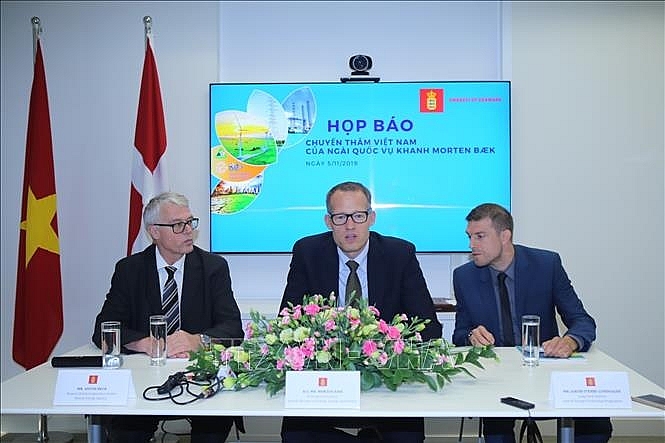Vietnam and Denmark double-down on decarbonisation co-operation
 |
| The official visit from Denmark spurred co-operation on the decarbonisation of energy sector |
One of the highlights of Baek's visit was the launch of the Vietnam Energy Outlook Report 2019 with the participation of more than 100 high-level Vietnamese decisionmakers, managers, as well as local and international experts.
The Vietnam Energy Outlook Report 2019 demonstrates scenarios showing how the Vietnamese energy sector can embark on a sustainable and low-cost development pathway, resulting in large CO2 emission reductions.
"I have had two excellent days in Hanoi, which have confirmed that the energy partnership between Vietnam and Denmark is strong, efficient, and produces tangible results. The Vietnam Energy Outlook Report 2019 is a landmark in our co-operation within energy modelling. It offers solutions to many of the challenges Vietnam is facing and could contribute to Vietnam's Power Development Plan VIII," Morten Baek said.
He also said that Vietnam should stop developing coal thermal power plants to save energy sources and contribute to decarbonisation. At the same time, Vietnam should promote renewable energy, especially from wind and solar sources. Denmark is committed to consolidating and expanding this collaboration in the coming years.
According to Vietnam Energy Outlook Report 2019, if coal thermal power development was stopped, Vietnam's total coal consumption would reduce by 221 million tonnes by 2050 and he country could reduce annual CO2 emissions by up to 39 per cent by 2050, compared to existing national plans. This equals approximately 370 million tonnes of CO2. "The Vietnamese authorities can rely on the report in realising a green and cost-effective energy transition whilst reducing dependence on imported fossil fuels," added Morten Baek.
Jakob Stenby Lundsager, long-term adviser to the Danish Energy Partnership Programme in Vietnam (DEPP), said that Vietnam consumes a huge amount of coal for thermal power. Thus, the country should avoid sticking with coal power and depending on imported coal in the long term.
Heconfirmed that reducing coal consumption would increase total energy costs by about 2 per cent by 2030 and 5 per cent by 2050, however, it could significantly help decarbonisation and reduce air pollution.
Unless Vietnam takes immediate action, it will be vitally dependent on coal imports from 2030. Additionally, emissions from burning coal will raise medical costs for the public to a forecasted $7-9 billion by 2030, and costs arising from air pollution are estimated at $23 billion by 2050, equivalent to 2 per cent of the GDP.
Since 1994, Denmark has provided Vietnam with more than $1.3 billion in grant development assistance. In November 2011, Denmark signed a joint declaration with the Government of Vietnam aimed at building a strategic partnership within the areas of climate change, environment, energy, and green growth.
The first phase of the DEPP started in 2013. The second phase started in 2017, and will be completed in 2020. The third phase with a duration of five years, is expected to start in 2020.
The programme is implemented by the Danish Energy Agency and the Ministry of Industry and Trade and supports capacity development for long-term energy sector planning with the Electricity and Renewable Energy Authority, capacity development for the integration of renewable energy into the power grid with the Electricity Regulatory Authority of Vietnam, as well as low-carbon development in the industrial sector with the Energy Efficiency and Sustainable Development Department.
What the stars mean:
★ Poor ★ ★ Promising ★★★ Good ★★★★ Very good ★★★★★ Exceptional
Related Contents
Latest News
More News
- VinaCapital launches Vietnam's first two strategic-beta ETFs (February 26, 2026 | 09:00)
- PM sets five key tasks to accelerate sci-tech development (February 26, 2026 | 08:00)
- PM outlines new tasks for healthcare sector (February 25, 2026 | 16:00)
- Citi report finds global trade transformed by tariffs and AI (February 25, 2026 | 10:49)
- Vietnam sets ambitious dairy growth targets (February 24, 2026 | 18:00)
- Vietnam, New Zealand seek level-up in ties (February 19, 2026 | 18:06)
- Untapped potential in relations with Indonesia (February 19, 2026 | 17:56)
- German strengths match Vietnamese aspirations (February 19, 2026 | 17:40)
- Vietnam’s pivotal year for advancing sustainability (February 19, 2026 | 08:44)
- Strengthening the core role of industry and trade (February 19, 2026 | 08:35)

 Tag:
Tag:























 Mobile Version
Mobile Version